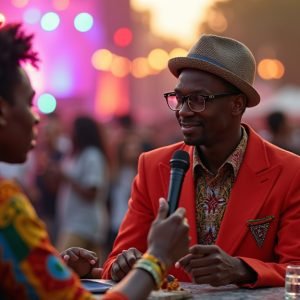Rap-punk duo Bob Vylan has forcefully denied allegations of antisemitism that have emerged following onstage comments made at the Glastonbury Festival. The band asserts they are being unjustly targeted for their vocal stance on the ongoing conflict in Gaza, a position that has since triggered a police investigation and widespread criticism.
Glastonbury Controversy Unfolds
The controversy centers on chants of “Death to the IDF” uttered during Bob Vylan’s performance. Authorities are now investigating whether these chants constitute a criminal offense. The British government was quick to condemn the remarks, labeling them as “appalling hate speech.” Echoing this sentiment, the BBC expressed regret for livestreaming what they described as “antisemitic sentiments” to a wider audience.
International Repercussions
The gravity of the situation has extended beyond the UK’s borders. U.S. authorities have taken the significant step of revoking the musicians’ visas, effectively barring them from entering the United States. This move underscores the international sensitivity surrounding the comments and the broader geopolitical tensions.
Broader Context of Gaza Conflict
The incident at Glastonbury occurs against a backdrop of escalating global tensions fueled by the intensified conflict in Gaza. Pro-Palestinian protests have become a visible feature in various international capitals and on college campuses across the globe. These demonstrations reflect deep divisions in public opinion regarding the conflict.
Differing Perspectives on Protests
While Israel and its supporters often view these pro-Palestinian demonstrations as inherently antisemitic, critics argue that such accusations are frequently weaponized. They contend that the label of antisemitism is sometimes used as a tactic to silence legitimate opposition and suppress criticism of Israeli government policies. This dynamic creates a complex and often contentious environment for public discourse on the issue.
Bob Vylan’s statement that they are being “targeted for speaking up” about the war in Gaza places their experience within this broader debate. The band’s perspective suggests that their artistic platform is being unfairly scrutinized due to their political messaging. The outcome of the police investigation and the ongoing debate surrounding free speech, protest, and the prevention of hate speech will likely shape future discussions on similar incidents within the music industry and beyond. The band’s recent tour announcements and their continued engagement with topical issues highlight their commitment to using their platform, despite facing significant backlash and international scrutiny. The hip hop and punk music scenes often serve as fertile ground for social and political commentary, and Bob Vylan’s experiences at Glastonbury are a stark reminder of the potent impact such commentary can have.


























